 ††
The Complete Stories,†1995††††
There are other translations of some of the short stories, especially "The
Metamorphosis," but for now this is the only place to find all of them
in one place.
††
The Complete Stories,†1995††††
There are other translations of some of the short stories, especially "The
Metamorphosis," but for now this is the only place to find all of them
in one place.
†
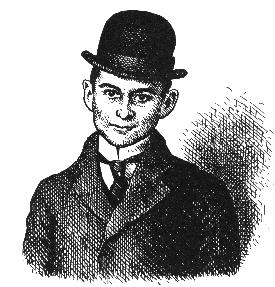 †††Introducing
Kafka, by David Zane Mairowitz and Robert Crumb, 1993† (also available
in hardcover as Kafka)† Biography and description
of Kafka's works in comic book—excuse me, graphic novel—style.†
A great primer.† If I were teaching a class about Kafka, I'd be sure
to put this on the Optional list. Click
here to visit the Crumb Museum. You don't really need to write that paper right now, do you??
†††Introducing
Kafka, by David Zane Mairowitz and Robert Crumb, 1993† (also available
in hardcover as Kafka)† Biography and description
of Kafka's works in comic book—excuse me, graphic novel—style.†
A great primer.† If I were teaching a class about Kafka, I'd be sure
to put this on the Optional list. Click
here to visit the Crumb Museum. You don't really need to write that paper right now, do you??
† ††
The Complete Stories,†1995††††
There are other translations of some of the short stories, especially "The
Metamorphosis," but for now this is the only place to find all of them
in one place.
††
The Complete Stories,†1995††††
There are other translations of some of the short stories, especially "The
Metamorphosis," but for now this is the only place to find all of them
in one place.
†
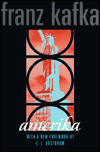 ††††
Amerika (Der Verschollene), 1912-1914, translated
by Willa and Edwin Muir, 1938††pbk. ed. 1996† This novel,
about 16-year-old Karl Rossmann being shipped off to America, isn't quite
as well known as The Castle or The Trial, which I think is
a shame.†† "Franz Kafka's first and funniest novel."† Who
are they trying to kid?everyone knows The Trial is much funnier!†
Kafka used to laugh hysterically when reading it to his friends.†
But seriously, this novel is a treat?especially the proto-Disneyland Theater
of Oklahoma.
††††
Amerika (Der Verschollene), 1912-1914, translated
by Willa and Edwin Muir, 1938††pbk. ed. 1996† This novel,
about 16-year-old Karl Rossmann being shipped off to America, isn't quite
as well known as The Castle or The Trial, which I think is
a shame.†† "Franz Kafka's first and funniest novel."† Who
are they trying to kid?everyone knows The Trial is much funnier!†
Kafka used to laugh hysterically when reading it to his friends.†
But seriously, this novel is a treat?especially the proto-Disneyland Theater
of Oklahoma.
†
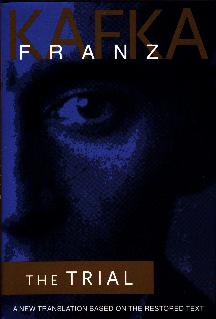 †††
The Trial, translated by Breon Mitchell, 1998 †††
Here's the brand-new translation of The Trial.†† I
just got this but it's quite intriguing.† It should be-this set me
back $24!† ;-)† The story of Joseph K., arrested for a crime
he knows nothing about and forced to deal with the shadowy Court investigating
him, this has been seen as everything from a presentiment of totalitarianism
to a psychological study.
†††
The Trial, translated by Breon Mitchell, 1998 †††
Here's the brand-new translation of The Trial.†† I
just got this but it's quite intriguing.† It should be-this set me
back $24!† ;-)† The story of Joseph K., arrested for a crime
he knows nothing about and forced to deal with the shadowy Court investigating
him, this has been seen as everything from a presentiment of totalitarianism
to a psychological study.
†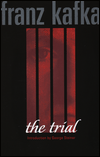 ††††
The Trial, translated by Edwin and Willa Muir,
1937††pbk. ed. 1995† The older version of The Trial.†
The differences, besides the translation itself, is that this has the
excised passages not in the other one.† All right, so you probably
don't see the point, but still of interest. There's nothing really wrong with
the Muir translations, it's just that they frequently read more like British novels
of the early-to-mid 20th century than what Kafka originally wrote.
††††
The Trial, translated by Edwin and Willa Muir,
1937††pbk. ed. 1995† The older version of The Trial.†
The differences, besides the translation itself, is that this has the
excised passages not in the other one.† All right, so you probably
don't see the point, but still of interest. There's nothing really wrong with
the Muir translations, it's just that they frequently read more like British novels
of the early-to-mid 20th century than what Kafka originally wrote.
†
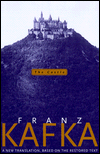 ††††
The Castle, translated by Mark Harmon, 1998††
Kafka's third and last novel is the story of a land surveyor
named K. attempting to gain admittance to the mysterious Castle and his
adventures in the village there.† The new translation of The Castle
does a much better job of conveying the sense of what Kafka actually
wrote, as opposed to loading it down with the translator's notions of what
they think it should be about.† Now when are they going to put out
the new translation of Amerika?
††††
The Castle, translated by Mark Harmon, 1998††
Kafka's third and last novel is the story of a land surveyor
named K. attempting to gain admittance to the mysterious Castle and his
adventures in the village there.† The new translation of The Castle
does a much better job of conveying the sense of what Kafka actually
wrote, as opposed to loading it down with the translator's notions of what
they think it should be about.† Now when are they going to put out
the new translation of Amerika?
†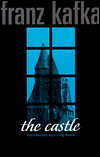 ††††
The Castle, 1922, translated by Edwin and
Willa Muir, 1930†pbk. ed. 1995†††This is not to say that the
old Muir translation is worthless.† For one thing, it's cheaper :o).†
More importantly, though, you can get a rather different take on the story,
owing to the Muirs' own interpretation of it as well as the literary
and intellectual trends prevailing at the time (1930s).† You know
what they say?"The translator is a traitor," which could go for almost
anything on this page, really.
††††
The Castle, 1922, translated by Edwin and
Willa Muir, 1930†pbk. ed. 1995†††This is not to say that the
old Muir translation is worthless.† For one thing, it's cheaper :o).†
More importantly, though, you can get a rather different take on the story,
owing to the Muirs' own interpretation of it as well as the literary
and intellectual trends prevailing at the time (1930s).† You know
what they say?"The translator is a traitor," which could go for almost
anything on this page, really.
 ††† Diaries,
1910 - 1923,†pbk ed. 1988 Although Kafka himself would doubtless
be really upset if he caught you paging through his diaries, they are extremely
revealing and let you see into the man.
††† Diaries,
1910 - 1923,†pbk ed. 1988 Although Kafka himself would doubtless
be really upset if he caught you paging through his diaries, they are extremely
revealing and let you see into the man.
†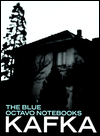 ††††
The Blue Octavo Notebooks, pbk. ed. 1993††† Not
quite a diary or a journal, this contains miscellaneous thoughts and little
snatches of stories.
††††
The Blue Octavo Notebooks, pbk. ed. 1993††† Not
quite a diary or a journal, this contains miscellaneous thoughts and little
snatches of stories.
††† Letters to Friends, Family and Editors,† Letters to Felice,† Letters to Milena††† Finding the Letters is a tough job, since they haven't been reprinted for ages.† Rather fascinating, though.
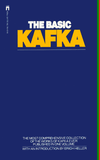 ††††
The Basic Kafka edited by Erich Heller, 1984†
Cheap and portable, this contains stuff like "The Metamorphosis",
"The Judgment," and the Letter to His Father.
††††
The Basic Kafka edited by Erich Heller, 1984†
Cheap and portable, this contains stuff like "The Metamorphosis",
"The Judgment," and the Letter to His Father.
††††
Franz Kafka: A Biography†
by Max Brod† pbk ed. 1995†† Kafka's best friend
Max Brod's flawed but seminal biography.
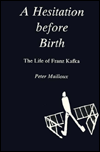 †††A Hesitation Before Birth† by Peter Mailloux, 1988
A 622-page, exhaustively researched
biography.† And I do mean exhaustive.† Some deficiencies but
worth the long haul—and I do mean long.
†††A Hesitation Before Birth† by Peter Mailloux, 1988
A 622-page, exhaustively researched
biography.† And I do mean exhaustive.† Some deficiencies but
worth the long haul—and I do mean long.
 †††
The Nightmare of Reason: A Life of Franz Kafka by
Ernst Pawel, 1984 One of the best biographies, even though it comes
in at a "mere" 466 pages. Not quite as detailed or extensive as A Hesitation
Before Birth, but it is easier to read and to get into, which is a big plus.
†††
The Nightmare of Reason: A Life of Franz Kafka by
Ernst Pawel, 1984 One of the best biographies, even though it comes
in at a "mere" 466 pages. Not quite as detailed or extensive as A Hesitation
Before Birth, but it is easier to read and to get into, which is a big plus.
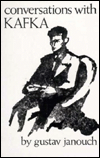 †††Conversations with Kafka by Gustav Janouch,
expanded edition, 1971††† This purpots to be the transcripts of
conversations Janouch had with Franz Kafka. At the time (1920) Janouch was 17 and his father
worked in the same Workers' Accident Insurance Institute as Kafka, and after Kafka saw
some of Janouch's poems they began talking together in Kafka's office and while
taking walks around Prague. The veracity of these conversations has been debated
(How could he remember 200 pages of material so exactly?), although it must be
noted that both Max Brod and Dora Diamant felt they were exactly
like the Kafka they knew. No matter what the truth is, though, they are very
interesting in themselves.
†††Conversations with Kafka by Gustav Janouch,
expanded edition, 1971††† This purpots to be the transcripts of
conversations Janouch had with Franz Kafka. At the time (1920) Janouch was 17 and his father
worked in the same Workers' Accident Insurance Institute as Kafka, and after Kafka saw
some of Janouch's poems they began talking together in Kafka's office and while
taking walks around Prague. The veracity of these conversations has been debated
(How could he remember 200 pages of material so exactly?), although it must be
noted that both Max Brod and Dora Diamant felt they were exactly
like the Kafka they knew. No matter what the truth is, though, they are very
interesting in themselves.
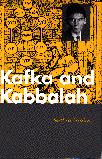 †††
Kafka and Kabbalah by Karl Erich GrŲzinger, 1994††† This
book argues that the Jewish element in Kafka, especially the mystical, Kabbalistic
side, has been largely overlooked, and provides a lengthy comparison of Kafka's
works with Kabbalistic texts and stories. Highly interesting to read, even if somewhat
overly speculative about the influences on Kafka and how much he knew about the Kabbalah.
†††
Kafka and Kabbalah by Karl Erich GrŲzinger, 1994††† This
book argues that the Jewish element in Kafka, especially the mystical, Kabbalistic
side, has been largely overlooked, and provides a lengthy comparison of Kafka's
works with Kabbalistic texts and stories. Highly interesting to read, even if somewhat
overly speculative about the influences on Kafka and how much he knew about the Kabbalah.
†††
Milena: The Tragic Story of Kafka's Great Love by
Margarete Buber-Neumann, pbk ed. 1997††† Bring
out your hankies for this one.† This isn't about Kafka per se but
about one of his girlfriends, Milena JesenskŠ, who was a very strong, intelligent,
corageous woman.† Buber-Neumann met her in the concentration camp
at RavensbrŁck and was so struck by her she wrote this book.
 †††
Kafka, Love and Courage: The Life of Milena JesenskŠ by
Mary Hockaday, 1997 A considerably more detailed life of Milena,
and very well-researched, even if not quite as personal as the previous book.
†††
Kafka, Love and Courage: The Life of Milena JesenskŠ by
Mary Hockaday, 1997 A considerably more detailed life of Milena,
and very well-researched, even if not quite as personal as the previous book.
 †††
Kafka's Prague: A Travel Reader by Klaus
Wagenbach, 1996 Even if you aren't going to Prague anytime soon, this
book really takes you into Kafka's world and shows you what it was like for him there.
†††
Kafka's Prague: A Travel Reader by Klaus
Wagenbach, 1996 Even if you aren't going to Prague anytime soon, this
book really takes you into Kafka's world and shows you what it was like for him there.
††† Give
it Up!† and Other Short Stories by Franz Kafka† Illustrated
by Peter Kuper, 1995†† Illustrated versions of some
of Kafka's shorter stories.† Strangely disturbing, but in a good way,
like much of Kafka's work.
 †††
Le SiŤcle de Kafka (The Century of Kafka), 1984 †††
To mark the 100th anniversary of Kafka's birth in 1983, the Centre Georges
Pompidou in Paris had an extensive exhibit about him.† This book is
kind of the official record.† Although it's in French, there's a lot
of stuff in here: pictures, essays, and intriguingly, two different
versions of the first couple of pages of† Le Ch‚teau in
French.†† Kind of arcane, but still interesting.
†††
Le SiŤcle de Kafka (The Century of Kafka), 1984 †††
To mark the 100th anniversary of Kafka's birth in 1983, the Centre Georges
Pompidou in Paris had an extensive exhibit about him.† This book is
kind of the official record.† Although it's in French, there's a lot
of stuff in here: pictures, essays, and intriguingly, two different
versions of the first couple of pages of† Le Ch‚teau in
French.†† Kind of arcane, but still interesting.
† †††††††
Kafka's Dick† by Alan Bennett, 1986†††††
Where the hell do they get these names?!?† This play is a riot.†
It focuses on the ridiculousness of much literary criticism (I think),
taking as a starting point some Freudians' theory that the way he wrote
had something to do with his alleged, er, lack of physical endowment.†
Click here to read a couple of brief excerpts.
†††††††
Kafka's Dick† by Alan Bennett, 1986†††††
Where the hell do they get these names?!?† This play is a riot.†
It focuses on the ridiculousness of much literary criticism (I think),
taking as a starting point some Freudians' theory that the way he wrote
had something to do with his alleged, er, lack of physical endowment.†
Click here to read a couple of brief excerpts.
†
†
Philip Roth,† "The Professor in Prague" and "I
Always Wanted You to Admire My Fasting; or Looking at Kafka"††††
A couple of short stories in A Philip Roth Reader about
Kafka, the first about an American professor traveling to Prague and ending
up dreaming about visiting a prostitute Kafka went to, and the other about
Kafka living to become a Hebrew teacher in New Jersey, of all places.†
Pleasantly obscene, shall we say.† But what were you expecting
from the author of Portnoy's Complaint? Click
here to visit the Philip Roth homepage.
†
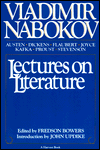 ††††
Lectures on Literature
by Vladimir Nabokov, 1980†† This contains seven lectures
on masterpieces of European fiction, including The Metamorphosis.†
Really makes you think.† Click
here for the text of the lecture on Metamorphosis.† Click
here to go to Waxwing.
††††
Lectures on Literature
by Vladimir Nabokov, 1980†† This contains seven lectures
on masterpieces of European fiction, including The Metamorphosis.†
Really makes you think.† Click
here for the text of the lecture on Metamorphosis.† Click
here to go to Waxwing.
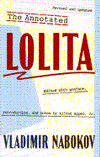 †††† The
Annotated Lolita by Vladimir Nabokov††† While
we're at it, I might as well recommend Lolita, a great novel, but
definitely not for the squeamish.† I recommend the annotated edition,
especially if you can't read French or if you don't "get" the somewhat
obscure literary references.† Click
here to go to Zembla, the Nabokov Butterfly Net.
†††† The
Annotated Lolita by Vladimir Nabokov††† While
we're at it, I might as well recommend Lolita, a great novel, but
definitely not for the squeamish.† I recommend the annotated edition,
especially if you can't read French or if you don't "get" the somewhat
obscure literary references.† Click
here to go to Zembla, the Nabokov Butterfly Net.
†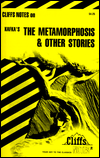 †††
Cliff's Notes††† And,
of course, we have the (in)famous Cliff's Notes.† I had a teacher
once who threatened to flunk anyone using such a blatant cheating device,
although you have to wonder just how they'd find this out.† My own
feeling is that anything at all that helps you follow and/or understand
the story can't be all bad, especially with someone as (occasionally)
obscure and confusing as Kafka (sorry).† That is, as long as you read
the actual story! Click here to visit the official
Cliff's Notes website.
†††
Cliff's Notes††† And,
of course, we have the (in)famous Cliff's Notes.† I had a teacher
once who threatened to flunk anyone using such a blatant cheating device,
although you have to wonder just how they'd find this out.† My own
feeling is that anything at all that helps you follow and/or understand
the story can't be all bad, especially with someone as (occasionally)
obscure and confusing as Kafka (sorry).† That is, as long as you read
the actual story! Click here to visit the official
Cliff's Notes website.
†
